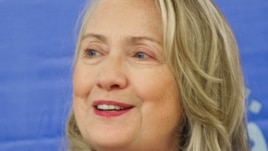U.S.
Secretary of State Hillary Rodham Clinton delivers remarks for the
launch of the Brunei-U.S. English Language Enrichment Project for ASEAN
at Universiti Brunei Daussalam in Bandar Seri Begawan, Brunei, September
7, 2012.
VOA News
September 07, 2012
U.S.
Secretary of State Hillary has arrived in Russia for a meeting of
Asia-Pacific leaders, while a Chinese state newspaper is warning
Washington not to use the annual economic summit to focus on political
differences.
Clinton arrived Friday in the far eastern Russian
city of Vladivostok after wrapping up her six-nation tour of Asia that
largely focused on the territorial disputes between China and several
key U.S. allies.
The Asia Pacific Economic Cooperation (APEC)
summit is expected to highlight efforts to re-energize world and
regional economic growth. The 21-member APEC forum accounts for 40
percent of the world's population, 54 percent of economic output and 44
percent of trade.
Read more >>>>
For a little background, here is an excerpt from a press briefing by a senior State Department official en route to Vladivostok.
So guys, just very quickly, just on where we’re going – I know you all know, but so Vladivostok in Russian means – “vlad,” as Steve knows, means power, and “vostok” is east.
So it means power of the east and has always been sort of periodically
through Russian history the point in which Russia has tried to be active
in Asia.
And so one of the things that we’ve seen in that last
couple of months is another renewed effort on the part of Russia to
articulate that they want to play a larger role in the Asia Pacific
region. So the last time this happened was in 1986 when Mikhail
Gorbachev gave a famous speech in Vladivostok about Russia wanting to
play a more purposeful role. In fact, they have not played a very active
role to date. They are part of the Six-Party Talks with North Korea,
but their engagement is episodic, and I think we’re going to want to be
talking with them more directly about what their goals and ambitions
are. We have welcomed them to engage in a stronger dialogue on Asia, and
I think we’ll be looking to take them up on that possibility over the
course of the next couple of months.
So APEC – we have a couple of
things that we’re going to try to accomplish and nail down this year.
The first is, last year the leaders came to a general agreement on trade
within the APEC countries on environmental goods and services. But in
fact, as is often the case in these complex negotiations, the challenge
is in the details, and so we’ve spent the last year trying to nail down
what specific products and services are included in that list, and we
hope to be able to conclude that in the next couple of days. That’s
actually quite significant if we can accomplish it because this is, by
far and away, the largest potential growing market associated with
environmental goods and services.
Second is, a lot of Asian
countries are nervous about food security, particularly in the rice
supplies and the cost of rice, and so that will be a subject
particularly on the second day. But really what these meetings are about
more than anything else are the conversations in the hallways and what
takes place in the bilateral meetings. I think as [Senior State
Department Official One] said, we anticipate the Secretary will have a
range of discussions with Asian interlocutors, and most of them have
requested a chance to sit down and talk with her.
I think we will
see, in one fashion or another, every one of the ASEAN leaders. And in
those discussions, we’re going to want to compare notes on what’s
transpiring with regard to the code of conduct. I think the Secretary
will also want to debrief them on her recent stops both at ASEAN and as
it relates to her visit in China. She’ll be meeting with the heads –
with the presidents of – the President of Korea and the Prime Minister
of Japan. We’ll talk about a variety of bilateral business, but we will
also remind both countries of the importance we place on their
determination to work well together. And we have been concerned by
tensions of late between Tokyo and South Korea – Tokyo and Seoul.
I
also wanted to give you guys just a little bit of context of what we
have seen since we’ve left Beijing. I urge you to take a look at the
speech that Prime Minister Lee, the Prime Minister of Singapore, gave
yesterday – a very important speech, and it’s important because it was
given in Beijing on a number of fronts. First of all, his overall
message is the message that Secretary Clinton and the United States and
other countries have been articulating now for months – the importance
of dealing with the issue of the South China Sea constructively,
diplomatically, and articulating that the code of conduct is the best
way forward.
He also was pretty clear about Singapore and ASEAN’s
desire for there to be a good relationship between China and the United
States, and in fact, he went into some detail about how the United
States has historically rallied from challenging circumstances, and that
he believes, as do others, that the United States is going to play an
extraordinarily important role in the Asia Pacific region for decades to
come, and in fact, we’re going nowhere. We’re going to be around and
deeply engaged.

